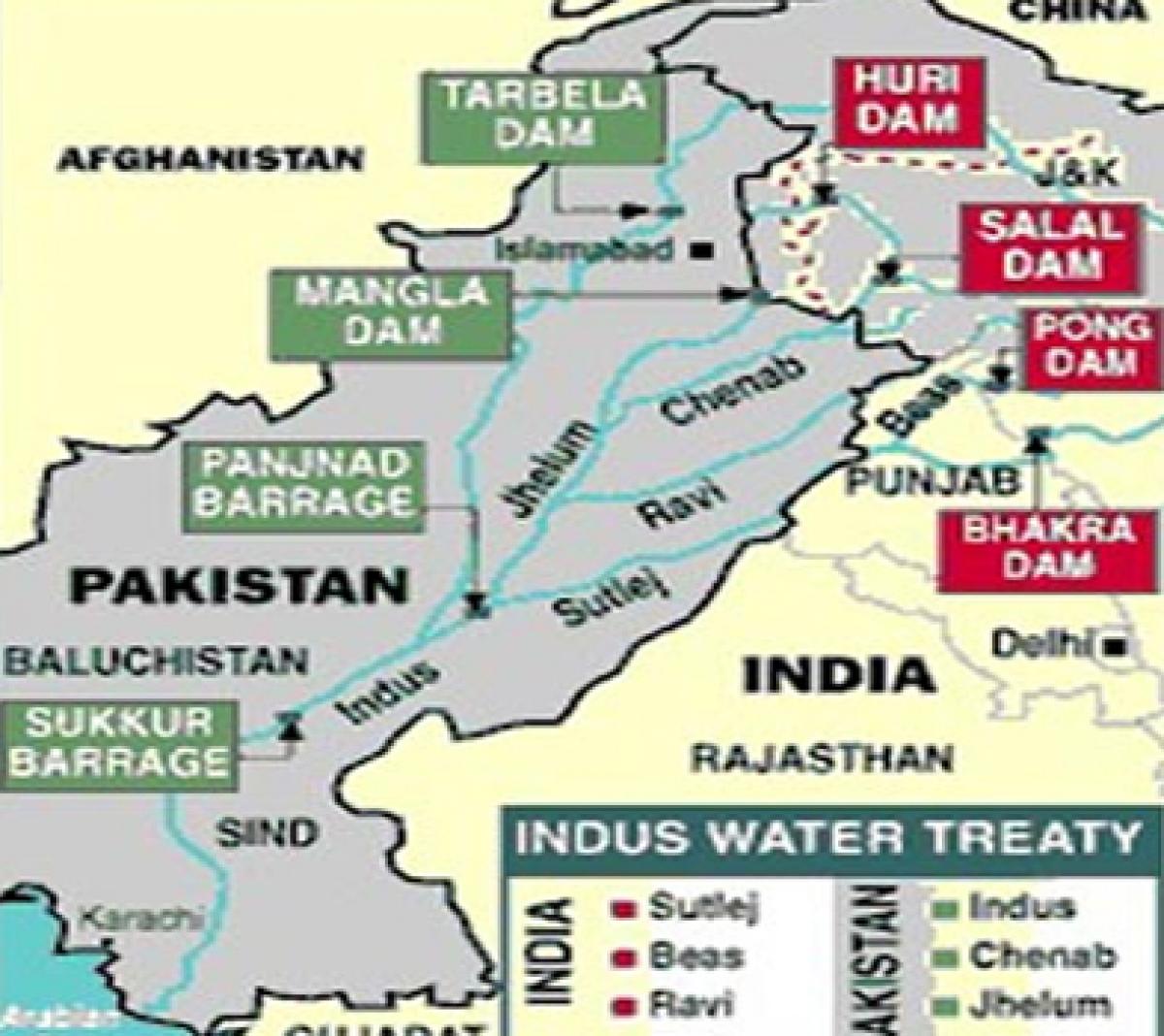INDUS WATER TREATY 1960
Indus Waters Treaty, treaty, signed on September 19, 1960, between
India and Pakistan and brokered by the World Bank. The treaty fixed and
delimited the rights and obligations of both countries concerning the use of
the waters of the Indus River system. It was signed in Karachi on 19 September 1960 by Indian Prime
Minister Jawaharlal Nehru and Pakistani President Ayub Khan.
The Treaty gives control over the waters of the three "eastern
rivers" — the Beas, Ravi and Sutlej with a mean annual flow of 33 million
acre-feet (MAF) — to India, while control over the waters of the three
"western rivers" — the Indus, Chenab and Jhelum with a mean annual flow
of 80 MAF — to Pakistan. India has about 20% of the total water carried by the
Indus system while Pakistan has 80%.
The treaty allowed India to use western rivers water for limited
irrigation use and unrestricted use for power generation, domestic, industrial
and non-consumptive uses such as navigation, floating of property, fish
culture, etc. while laying down precise regulations for India to build projects
India has also been given the right to generate hydroelectricity
through the run of the river (RoR) projects on the Western Rivers which,
subject to specific criteria for design and operation is unrestricted.
Permanent Indus Commission was set up as a bilateral commission to
implement and manage the Treaty. The Commission solves disputes arising over
water sharing.
Indus Waters Treaty Issues
There have been issues concerning the treaty with both sides
accusing each other of violating the terms of the treaty.
In 2016, Pakistan had approached the World Bank raising concerns of
India’s Kishenganga and Ratle hydroelectric power projects being constructed in
Jammu & Kashmir.
The Tulbul project (which is a navigation lock-cum-control structure
at the mouth of the Wular Lake, situated on the Jhelum from Anantnag to
Srinagar and Baramulla) was suspended in 1987 after Pakistan objected to it.
Recently, the government decided to review this suspension not taking into
account Pakistan’s protests.
Pakistan’s Left Bank Outfall Drain (LBOD) project passes through the
Rann of Kutch in India’s Gujarat. The project was constructed without India’s
consent. India has objected because this is in contravention to the IWT. The
lower riparian state is in India and hence it needs to be given all details. There
is also the danger of flooding in the state of Gujarat.
Recently, the bilateral relations between India and Pakistan have
taken on a downward spiral. In the wake of the Uri attacks on India, Prime
Minister Modi remarked that blood and water cannot flow simultaneously
indicating to Pakistan that its support to terrorism across the border will
lead to India rethinking its generous stance on the IWT. Indeed, many experts
believe that the treaty is more favourable towards Pakistan than India.
Another issue cited with the IWT is that it was signed on India’s
behalf by the then PM Nehru. However, he was not the head of state and that the
treaty ought to have been signed by the head of state, the then president of
the country.
HISTORICAL BACKGROUND
· The waters of the Indus
System of Rivers begin mainly in Tibet and the Himalayan mountains in the
states of Himachal Pradesh and Jammu and Kashmir.
· They flow through the
states of Punjab, Haryana, Rajasthan and Sindh before emptying into the Arabian
Sea south of Karachi and Kori Creek in Gujarat
· The average annual
available water resource in Pakistan is 177 MAF or 218.4 billion cubic meters.
· Where once there was
only a narrow strip of irrigated land along these rivers, developments over the
last century have created a large network of canals and storage facilities that
provide water for more than 47 million acres (190,000 km2) in Pakistan alone by
2009, one of the largest irrigated area of any one river system.
· The partition of British
India created a conflict over the waters of the Indus basin. The newly formed
states were at odds over how to share and manage what was essentially a
cohesive and unitary network of irrigation.
· Furthermore, the
geography of partition was such that the source rivers of the Indus basin were
in India. Pakistan felt its livelihood threatened by the prospect of Indian
control over the tributaries that fed water into the Pakistani portion of the
basin.
· Where India certainly
had its own ambitions for the profitable development of the basin, Pakistan
felt acutely threatened by a conflict over the main source of water for its
cultivable land. During the first years of partition, the waters of the Indus
were apportioned by the Inter-Dominion Accord of May 4, 1948
· This accord required
India to release sufficient waters to the Pakistani regions of the basin in
return for annual payments from the government of Pakistan.
· The accord was meant to
meet immediate requirements and was followed by negotiations for a more
permanent solution.
· However, neither side
was willing to compromise their respective positions and negotiations reached a
stalemate. From the Indian point of view, there was nothing that Pakistan could
do to force India to divert, from any of its schemes, the river water into
irrigation canals of Pakistan
· Pakistan wanted to take
the matter at that time to the International Court of Justice, but India
refused, arguing that the conflict required a bilateral resolution..
IMPLICATION
From the Indus System of Rivers, India got nearly 33 MAF at 16%
whereas Pakistan got nearly 177 MAF at 84%.
However India can use the western river waters for irrigation up to
701,000 acres with new water storage capacity not exceeding 1.25 MAF and new
storage works with hydro power plants (excluding permitted water storage under
unlimited run of the river hydro projects) with storage not exceeding 1.6 MAF
and nominal flood storage capacity of 0.75 MAF.
These water allocations made
to the Jammu and Kashmir state of India are meager to meet its irrigation water
requirements whereas the treaty permitted enough water to irrigate 80.52% of
the cultivated lands in the Indus river basin of Pakistan.
The storage capacity
permitted by the treaty for hydro power generation is less than the total
annual silt that would accumulate in the reservoirs if the total hydro
potential of the state was to be exploited fully.[citation needed] Pakistan is
also losing additional benefits by not permitting moderate water storage in
upstream J&K state whose water would be ultimately released to the Pakistan
for its use and avoid few dams requirement in its territory. Ultimately,
J&K state is bound to resort to costly de-silting of its reservoirs to keep
them operational.
Whereas Pakistan is planning
to build multi purpose water reservoirs with massive storage for impounding
multi year inflows such as 4,500 MW Diamer-Bhasha Dam, 3,600 MW Kalabagh Dam,
600 MW Akhori Dam, Dasu Dam, Bunji Dam, Thakot dam, Patan dam, etc. projects
with huge population resettlement.In case of any dam break, downstream areas in
Pakistan as well as Kutch region in India would face unprecedented water deluge
or submergence as these dams are located in high seismically-active zones.
In 2003 J&K state assembly passed a unanimous resolution for the
abrogation of the treaty and again in June 2016, the Jammu and Kashmir assembly
demanded for revision of the Indus Water Treaty. The legislators feel that the
treaty trampled upon the rights of the people and treats the state of Jammu and
Kashmir as a non-entity
However, India derives military advantage out of IWT as its scope is
confined to the Indus System of Rivers (both eastern and western rivers) basin
area located in India and also in Ravi and Sutlej basins located in Pakistan
per Articles II(1 to 4) and III(2 to 3) and the IWT deals only with the sharing
of water available/flowing in Indian part between Pakistan and India.As per the
IWT, Pakistan bombing / destroying dams, barrages, power stations, etc. located
in Indian part of Indus System of Rivers is violation of the IWT which can lead
to abrogation of IWT
SOURCE WIKIPEDIA










0 Comments